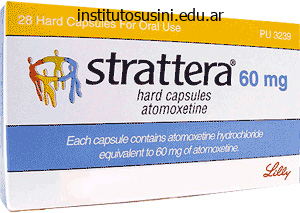


Strattera 40mg
30 pills - $86.64
60 pills - $131.69
90 pills - $176.75
120 pills - $221.80
180 pills - $311.90
Strattera 25mg
30 pills - $32.65
60 pills - $51.42
90 pills - $70.18
120 pills - $88.94
180 pills - $126.46
270 pills - $182.74
360 pills - $239.03
Strattera 18mg
30 pills - $35.11
60 pills - $54.90
90 pills - $74.69
120 pills - $94.48
180 pills - $134.06
270 pills - $193.43
360 pills - $252.81
Strattera 10mg
60 pills - $32.83
90 pills - $44.32
120 pills - $55.81
180 pills - $78.80
270 pills - $113.27
360 pills - $147.74
Patients who are gardeners medicine disposal cheap 25 mg strattera, farmers, landscapers, marijuana smokers, or construction workers may have more extensive fungal spore exposure than others, and can be colonized before transplantation, placing them at risk for posttransplant reactivation. The availability of newer azole antifungals such as voriconazole and posaconazole has improved the treatment of invasive mold infections, but these are still associated with high mortality. Immunosuppressant dose modification is necessary for patients receiving calcineurin inhibitors and requiring azole treatment due to inhibition of the cytochrome p450 system. Cryptococcus is a yeast associated with birds, bird droppings, and soil exposures. Cryptococcus most commonly causes meningitis, but can also be associated with pulmonary nodules, infection of abdominal ascites, cellulitis, undifferentiated fever, and many other presentations. Endemic mycoses, such as histoplasmosis in the American Midwest and coccidioidomycosis in the American Southwest, may reactivate after transplant. Evidence of remote histoplasmosis in the form of calcified granulomata in the lungs and spleen is common in individuals residing in the Midwest, especially those with farming or other significant outdoor exposure. No specific prophylaxis is recommended, but individuals in endemic areas with serologic evidence or clinical history of coccidioidomycosis may require long-term prophylaxis with azole antifungals to avoid reactivation. All individuals without allergies to sulfa should receive prophylaxis with trimethoprim-sulfamethoxazole for at least 6 months posttransplant, although some centers prefer 1 year or longer. Trimethoprim-sulfamethoxazole also provides some preventive activity against Nocardia, Toxoplasma, and Listeria. For sulfa-allergic patients, dapsone, aerosolized pentamidine, or atovaquone are alternatives. Individuals who have resided in tropical countries or the southeastern United States are frequently screened pretransplant with Strongyloides IgG serology, and treated with ivermectin preemptively if seropositive. Chagas disease (Trypanosoma cruzi) is a risk for both recipient reactivation and, occasionally, donor-derived infection in patients (or donors) from endemic areas of Central and South America. All of the aforementioned vaccines are nonlive and may be administered posttransplant, although their efficacy is likely greater in the pretransplant period. Yearly influenza vaccine (injected, nonlive) should be administered posttransplant to all recipients, with the exception of waiting until after 3 months posttransplant to maximize the likelihood of seroconversion. This requirement of waiting until 3 months posttransplant can be waived in the event of an active influenza outbreak. Live vaccines are not currently recommended posttransplant, although a few pediatric studies have suggested safety in some patients.
Nemrok, 64 years: Efficacy of calcipotriol in psoriasis is rated comparable to a moderate potency topical steroid.
Gancka, 27 years: Preliminary results at a 10M dose for 24 hours reveal permeation to basolateral side of 3.
Umbrak, 57 years: This presentation will attempt to provide rationales for selecting the top dose for general toxicology studies.
Irhabar, 46 years: Though elimination of weak bases (morphine, amphetamine) can be enhanced by acidifying urine, this is not practiced clinically, because acidosis can induce rhabdomyolysis, cardiotoxicity and actually worsen outcome.